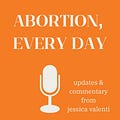On audio today: All the below updates, extra commentary about the protests at Kavanaugh’s home & more, and a sneak peak of a column I’m working on about some cagey polling from a Republican women’s group.
Let’s start today with the story that gave me the biggest headache: Brett Kavanaugh’s neighbors are irritated about the demonstrations in front of the Justice’s house. They’re pro-choice, they say, they just can’t deal with the “loud and vulgar” protesters (apparently there’s a chant about vaginas?). Here’s the rub: the protests only take place once a week for an hour. Come on.
On the state level: The GOP in Michigan are trying to get the judge who blocked the state’s anti-abortion law from going into effect to recuse herself. They say because she represented Planned Parenthood in a 1997 case and made donations to the organization in the past, she can’t be impartial. (The judge disclosed that connection when she was randomly assigned the case.)
The anti-abortion law in Louisiana is temporarily blocked again, meaning abortions can resume in the state—at least until July 29th when the extension runs out. West Virginia’s abortion ban has also been blocked by a judge, and the Attorney General there says he’s going to bring the case before the state Supreme Court.
If you’ve been following what’s happening in Kansas, you know that we’re coming up to the state’s August 2nd vote to change the state constitution to make it easier to attack abortion rights. Some experts think it all may come down to the turnout among young voters, so if you know any young people in Kansas, now is the time to reach out to them.
I’ve already told you about the move by Republicans in South Carolina to implement a total abortion ban without exceptions for rape, incest or health—a draconian bill that Republican House Majority Leader David Hiott, called “a huge opportunity.” (Gross.) But I wanted to link to this ABC News piece, specifically, because they did something really dangerous: They mirrored SC’s anti-choice language completely uncritically, writing that the bill “prevents in almost all cases killing a fetus while in the womb.” That is not exactly objective language. (Correction: the piece was written by Associated Press, and used by ABC News)
After a Mississippi abortion clinic was shuttered after the end Roe, it moved to New Mexico to continue care there. Naturally, a crisis pregnancy center decided to open right next door to the clinic.
And in Texas, colleges are confused about what kind of care and advice they can offer their students. The Texas Tribune’s piece on this opens by describing how the website for the University of Texas at Austin’s health center used to describe the various options students could pursue if they found themselves pregnant. After Roe, however, the university removed the entire section.
You may have noticed a 2021 North Carolina bill circulating online—legislation that would make it legal to use deadly force in defense of a fetus (aka, kill abortion providers or those helping someone obtain an abortion). You can rest somewhat easy: This is an old bill that is not going anywhere. It’s just gone viral because of how inflammatory it is. That said, you gotta love that someone found the time to put pen to paper making that argument. (Also: it’s not the first of its kind—there was a similar bill in South Dakota in 2011!)
Some good news: After Idaho’s trigger law went into effect, the Boise city council passed a resolution that would limit city resources from being used to pursue legal action against someone who has had an abortion, or performs one. The resolution means that city law enforcement can’t prioritize cases about abortion, and city agencies can’t use city funds to aid in the prosecution of abortion. More of this, please.
On the national stage: The New York Times is looking at where abortion is on the ballot for midterms, and takes a look at the post-Roe bump Democrats got in a new poll.
The White House is considering issuing an emergency health declaration, but one that’s limited to protecting access to abortion pills. It would use the Public Readiness and Emergency Preparedness (PREP) Act to protect health care providers and pharmacists from liability if they dispense medication abortion. (Sen. Elizabeth Warren has been pushing for broader measures, but specifically called for the use of the PREP Act in a recommendation to the President.)
In the meantime, Republicans have proposed a bill that would give women the ability to get child support while they’re pregnant. But it’s not actually because they want to increase support for mothers—it’s a move to further define personhood as starting at conception.
And just in case you had any doubts as to how Republicans really legislate around motherhood, consider this ProPublica article on how Texas Gov. Greg Abbott has been claiming to support families while refusing to expand Medicaid coverage. The eligibility requirements are so strict in Texas, in fact, that a single parent with one child would have to earn less than $196 a month to qualify.
NBC News also published a piece on the lack of political will among conservatives to do a damn thing around helping parents, and how they’re pushing money and energy into marriage promotion programs—and making it harder to get divorced—rather than actual financial or childcare help.
Meanwhile, Democrats are trying to protect women’s digital privacy in a post-Roe world. It’s something they need to do a lot faster: An investigation from The Markup that found Facebook was collecting personal information from women who visited crisis pregnancy centers and allowing the centers to use that data. With such private information, the centers (known for lying to women and using scare tactics) could target those women through ads, spread misinformation, or even use it to collect evidence for future criminal cases if those women end up getting abortions.
As more stories come out about pregnant people being denied treatment because of abortion bans, lots of outlets have quoted this study in the American Journal of Obstetrics and Gynecology that looked at how bans impacted women in two Texas hospitals. It’s harrowing, but worth checking out.
Some coverage to pay attention to: Media Matters continues to do great work. They’ve compiled a huge roundup of the way that right-wing media targeted the Indiana doctor who gave a 10 year-old in Ohio an abortion, and the way those attacks put her in danger.
Slate, another publication that’s been doing excellent work lately, has published an interview with professor Mary Ziegler from the University of California, Davis—an expert on the history of abortion—about the GOP’s strategy around rape exceptions.
And Buzzfeed has a piece up following a 26 year-old Cleveland woman as she tries to access an abortion. One particularly devastating quote on the denial she went through at first: “I don’t think they can be like, ‘Oh, we [struck down] Roe v. Wade, your scheduled appointment is canceled now. I don’t think they can do that.’”
Listen to this episode with a 7-day free trial
Subscribe to Abortion, Every Day to listen to this post and get 7 days of free access to the full post archives.













